Description
CHAPTER ONE
INTRODUCTION
1.1 BACKGROUND OF STUDY
This study is on The effectiveness and uses of accounting information for decision making in public sector organization case study bank of agriculture. One of the most effective uses of accounting information is decision making. Decision making has being described as a purposeful choosing from a number of alternative causes of action.
The accounting information provides managers with the necessary information they need. In this case, it is the accountants that provide the information with which the management uses for its decision making. Managements can only come up with a good decision if they are able to get correct accounting information from the accountant. In a situation where the accountant does not provide correct information: this is bond to affect the decision making of the management adversely.
The question now is, how business executive know the company is embarking on a favorable decision or unfavorable one. The answer to this question is based on the management and the accounting information.
According to Ray 1996, most top level business executives have background in accounting and finance than in any other field. The essence of using accounting information is to enable managers make wise decision. It is also used accounting information to set up system of internal control to increase efficiency and prevent fraud in companies.
Accounting information aids in profit making, budgeting and cost control. In a company, it is the duty of the management accountant to see that his company keeps good records and prepare proper financial regulations. Management accountants also need to keep up with the latest development in the use of computers and in the computer system design. Accountants provides many special reports for management, decision making. This function requires the gathering of both historical and projected data.
Indeed only a limited number of studies in international management research have focus on the role utilization of accounting information in the holistic context of decision making strategies, processes and preferences Carr etal 1994; woutersan and Verdaasdonk 2002.
Green wood and Hinings 1996 there is evidence which reveal the influence of accounting information in decision making process. it emphasize the important of a holistic context and which led to the integration of other institutional influence and multiple logics. It is in this context that the research wishes to evaluate the effectiveness and uses of accounting information for decision making in public sector.
In summary, accounting information is primarily concerned with data gathering from internal and external sources analyzing, processing, interpreting and communicating the result information for use within the organization so that management can make more effective plan, decisions and control operations.
1.2 STATEMENT OF THE PROBLEM
The central concern of management is decision. In making a sound decision the management needs some valuable and accurate information from the accountant. The accountant is at the services of the management by providing the management with the necessary information which they need for decision making.
In recent times, it was observed that cases of mismanagement, fraud and irregularities prevail in the organization.
What then is the role of accounting information in Bank of agriculture Has the role been affective Does accounting information control fraud, mismanagement and irregularities Does accounting information ensure the efficiency and effectiveness of management This study is aimed at providing answers the above questions.
1.3 OBJECTIVES OF THE STUDY
This research is aimed at examining how effective and efficient management apply accounting information in making business decision in public sector organizations.
The main objectives of this study are;
1. To identify how accounting information controls Fraud, mismanagement and irregularities.
2. To determine how useful and effective accounting information are to decision making in public sector organization.
3. To determine the relationship between the neglect of accounting information and decision making in public sector organizations.
1.4 RESEARCH QUESTION
The purpose of the study is to highlight the use of accounting information in Bank of agriculture and disclose the obstacles involved in the demand and supply of information. This therefore propels the following research question for this study:
1. How does accounting information control fraud, mismanagement and irregularities
2. How useful and effective is accounting information to decision making in public sector organizations
3. What are the effects of in availability of accounting information in public sector organizations
1.5 RESEARCH HYPOTHESIS
The null hypothesis is the one stated in a no difference form in effect of one or more independent variables on the dependent variable and is denoted as Ho. Alternative hypothesis is the one which predicts a difference and indicate the expected direction of that difference and is denoted as H1. The hypothesis to be tested in this study are as follows:
Ho: Accounting information does not control fraud, mismanagement and irregularities.
H1: Accounting information controls fraud, mismanagement and irregularities.
Ho: Accounting information is not effective in decision making in public sector organizations.
H1: Accounting information is effective in decision making in public sector organizations.
Ho: There is no relationship between the neglect of accounting information and decision making in public sector organizations
H1: There is relationship between the neglect of accounting information and decision making in public sector organization.
1.6 SIGNIFICANCE OF THE STUDY
Accounting information is very important in the life of any business. It is based on this information that the management will be able to make wise decisions. The accountants present the accounting information in such a way as to assist management in policy and decision making in the day to day operations of the company.
Based on the information produced, the management will have the benefits on using it to plan and control their current and future operations. Based on it also they will come up with their management decision and information of long term plans. The information also will help the management report historical information to outsiders
The account manager, based on the management plan target/standards will analyze the performance of the organization and access whether the organization actually attained the standard set by the management or not, if there is any variance, the management in charge of accounts will look into it to find out the causes of the variance and the report to the management based on that report. The management can make a wise decision that will take the cause of the variance into consideration. The use of accounting information is so important that the management of any organization cannot do without it.
Any organization that does not makes use of accounting information for their decision making is bound to be running into difficulties that lead to a setback.
1.7 SCOPE OF THE STUDY
The scope will take into consideration the uses and effectiveness of accounting information for effective decision making.
Decision making exist in every organization, for the purpose of this research the research will be considering only Bank of agriculture i.e. taking into consideration Calabar branch.
Accounting staff and manages of their cooperation will be interviewed for the purpose of getting relevant useful information for decision making, also to determine how effective to use the accounting information for their decision making. the recommendation and the conclusion will be based solely on the information gathered.
1.8 LIMITATION OF THE STUDY
Time factor: This was one of the major problems I encountered in the course of the study since the data collected was partly by personal interviews and persons to be interviewed had limited time to attend to me. Also the researcher has to allocate part of her time to class room work one and other activities.
Finance: Another factor that limited the scope of the study was the financial cost which consisted mostly of travelling expenses, cost of materials to be used for the study, cost of inputting the information collected into the computer, cost of diskette, cost of printing the hard copies and binding of the report. This consisted to limitation of my study.

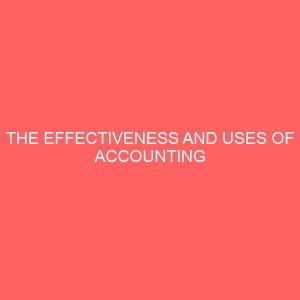
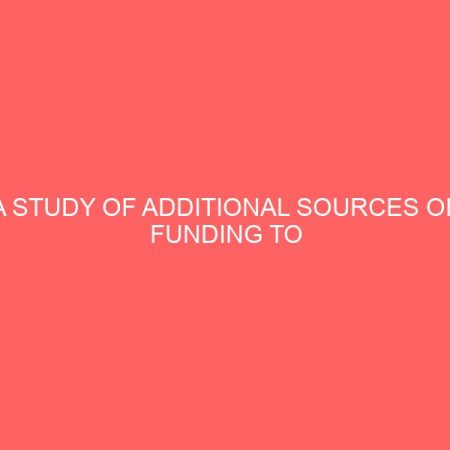
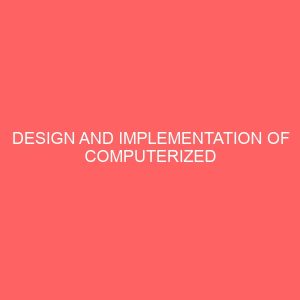
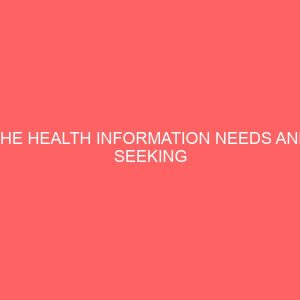
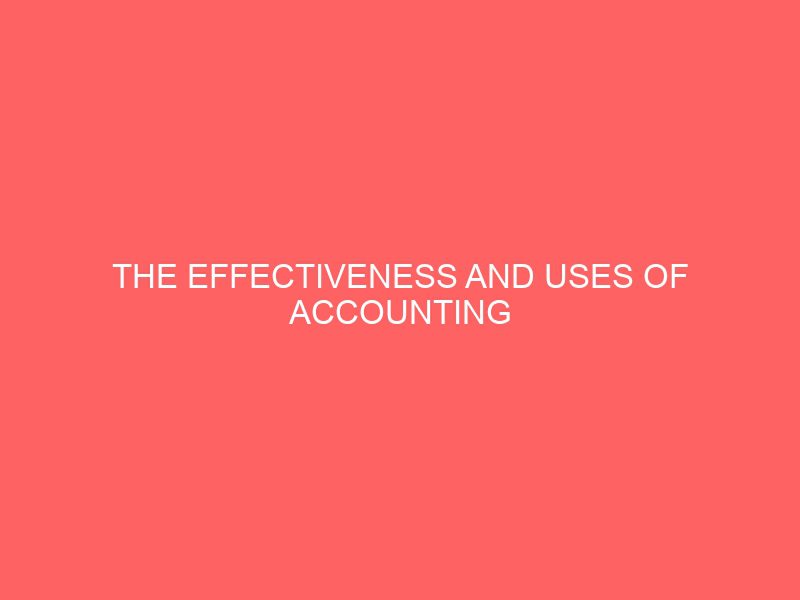
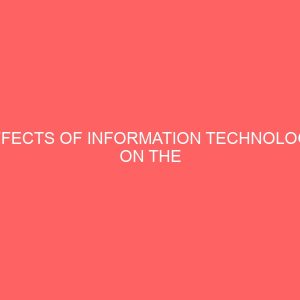

Reviews
There are no reviews yet.